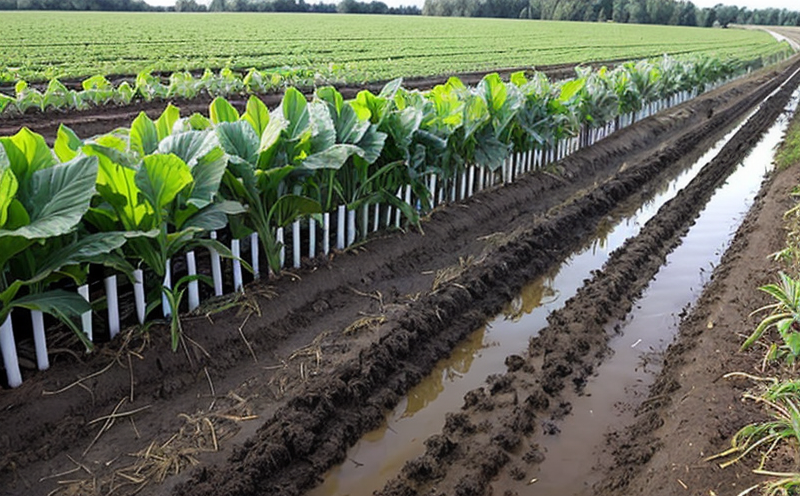APHA 4500 NO2 Nitrite Test in Agricultural Runoff Water
The APHA Method 4500 NO2-N (Nitrite-Nitrogen) test is a critical tool for assessing the presence and concentration of nitrite nitrogen in agricultural runoff water. This method, widely recognized by environmental scientists and compliance officers, provides detailed information on the health of aquatic ecosystems affected by agricultural activities.
Agricultural runoff can significantly impact surface waters through the introduction of nutrients like nitrate and nitrite. Excessive levels of these compounds can lead to eutrophication, which depletes oxygen in water bodies, harming fish and other aquatic life. Monitoring nitrite nitrogen is essential for understanding the extent of nutrient pollution and implementing mitigation strategies.
The APHA 4500 NO2-N test typically involves a series of chemical reactions that convert nitrite into a colorimetric form. The resulting color intensity is then compared to a standard curve, allowing for accurate quantification of nitrite nitrogen in parts per million (ppm). This method is highly sensitive and can detect even trace amounts of nitrite.
Water samples are often collected from various points along agricultural runoff pathways, such as ditches, streams, or retention ponds. Proper sample collection is crucial to ensure accurate results. Samples should be stored in airtight containers and kept cool until analysis to prevent any chemical changes that could affect the test outcomes.
The testing process itself requires precise laboratory techniques and specialized equipment. Instruments like spectrophotometers are used to measure the color intensity, which corresponds directly to nitrite levels in the water sample. Compliance officers and R&D engineers rely on these tests to ensure that agricultural runoff meets regulatory standards set by environmental agencies such as the United States Environmental Protection Agency (EPA).
Understanding the role of nitrite nitrogen is vital for managing nutrient pollution effectively. Agricultural practices can inadvertently contribute to increased levels of nitrite in water bodies, leading to ecological imbalances. By implementing regular testing using methods like APHA 4500 NO2-N, stakeholders can monitor and manage these impacts proactively.
The importance of this test extends beyond just compliance; it also plays a key role in sustainable agricultural practices. Farmers and environmental scientists use the results to optimize irrigation techniques, reduce fertilizer usage, and implement best management practices (BMPs) that minimize nutrient runoff into waterways.
Given its significance, accurate testing is paramount. Laboratories adhering to this method must have stringent quality control procedures to ensure consistent and reliable results. This includes calibration of instruments, standardization of reagents, and proficiency in sample handling techniques.
Applied Standards
The APHA 4500 NO2-N test is based on international standards such as the American Public Health Association (APHA) guidelines. This method is also recognized by regulatory bodies like the U.S. EPA and European Union directives, ensuring that the testing process aligns with global best practices.
The standard procedure involves several steps:
- Sampling of agricultural runoff water from various points along potential contamination pathways.
- Preparation of samples in airtight containers for transportation to the laboratory.
- Dilution of samples if necessary, depending on nitrite concentration levels.
- Measurement using spectrophotometric analysis to determine color intensity corresponding to nitrite concentrations.
The acceptance criteria for this test are stringent. Results must fall within specified tolerances, indicating that the water sample meets or exceeds regulatory standards set by environmental agencies. Compliance with these standards is crucial for maintaining ecological balance and ensuring public health.
Eurolab Advantages
At Eurolab, our commitment to excellence in laboratory testing ensures accurate, reliable results for the APHA 4500 NO2-N test. Our advanced instrumentation and trained technicians provide unparalleled precision and consistency.
- Expertise: Our team of scientists and engineers specializes in environmental testing, ensuring that every sample is handled with care and attention to detail.
- Technology: Equipped with state-of-the-art spectrophotometers, we provide high-precision measurement capabilities, which are essential for accurate nitrite determination.
- Quality Assurance: Our laboratories adhere strictly to international standards and best practices, ensuring consistent and reliable results.
- Compliance: Eurolab’s testing aligns with EPA guidelines and EU directives, providing clients with confidence in our compliance-focused approach.
We offer comprehensive services tailored to the needs of quality managers, compliance officers, R&D engineers, and procurement professionals. Our expertise in agricultural runoff water testing helps stakeholders make informed decisions about sustainable practices and regulatory compliance.
Competitive Advantage and Market Impact
- Accurate and Reliable Results: Eurolab’s precision ensures that results are accurate, providing reliable data for decision-making.
- Compliance with Global Standards: Our testing aligns with international standards like APHA, EPA, and EU directives, ensuring regulatory compliance.
- Innovative Solutions: We offer customized testing packages to meet specific client requirements, enhancing our market position.
- Expertise in Agricultural Runoff: Eurolab’s specialized knowledge in agricultural runoff water testing sets us apart from competitors and impacts the broader industry positively.
Our services contribute significantly to the improvement of environmental quality. By providing accurate data, we enable stakeholders to implement effective mitigation strategies that reduce nutrient pollution in aquatic ecosystems.





